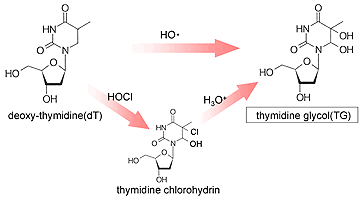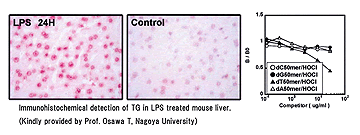 |
Oxidative Stress
Rev.081023 |
| [ Specific to DNA oxidation ] |
 |
Thymidineglycol (TG) is one of the major oxidation products of DNA. Thymidine (T) can be
damaged by oxidative stress such as radiation and energy metabolism.
Two different pathways to form TG have been suggested. Deoxythymidine in DNA is directly oxidised by hydroxy radical, to form TG.
TG can be also formed through an intermediate thymidine chlorohydrin, which is derived from hypochlorous acid (HOCl) from neutrophil
myeloperoxidase. Thymidineglycol is derived from DNA, not from RNA. TG is the oxidative stress marker secific for DNA damage. |
|
| [ Comparison with 8-OHdG ] |
|
8-hydroxy-2'-deoxyguanosine (8-OHdG) is one of the well-known DNA oxidation products.
In an lipopolysaccharide (LPS)-treated mouse liver, 8-OHdG can be stained in 24 hours after LPS treatment.
TG can be detected in 6 hours, and remain at least for 72 hours.
Anti TG monoclonal antibody (clone 2E8) has been established by Dr. Toshihiko Osawa (Nagoya Univ.). Poly dT (50 mer) has been
oxidised by OsO4 and injected to Balb/c mouse as immunogen. This antibody can react with thymidineglycol in DNA or
TG polymer, and suitable for immunohistochemistry. |
 |
|
| [ Specifications ] |
| Antigen: |
Thymidineglycol polymer. |
| Form: |
Lyophilized power. Reconstitute by 1000 µL of distilled water. 100 µg/mL of IgG. |
| Subclass: |
Mouse IgG1 (kappa), clone 2E8 |
| Specificity: |
Specific for DNA fragment containing thymidine glycol, and thymidine glycol polymer.
Cross reactivity have been tested to following analogues:
oxidized deoxycytidine polymer, oxidized deoxyguanosine polymer and oxidized deoxyadenosine polymer.
Not react with free thymidineglycol. |
| Application: |
Immunohistochemistry (antibody conc. 5 - 10 µg/mL) |
|
| Product name |
Code |
Content |
| Anti thymidineglycol (TG) monoclonal antibody |
MTG-100P |
100 µg IgG |
|
|
